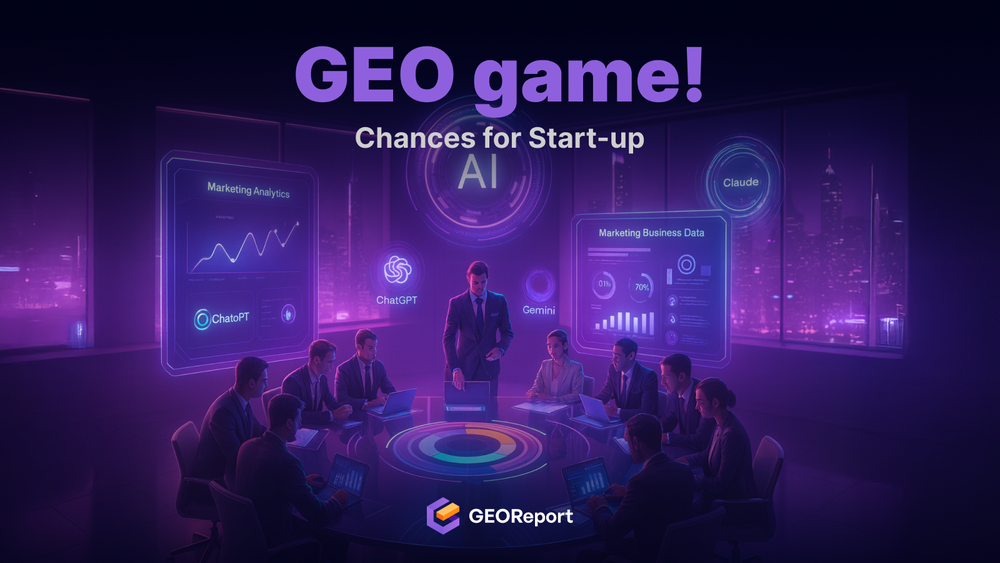BLUF: Startups can leverage Generative Engine Optimization (GEO) to amplify their brand visibility in AI-powered search by creating authoritative content, optimizing for natural language, and actively managing their digital presence across diverse platforms. This approach increases the likelihood of being cited and recommended by generative AI, driving targeted traffic and establishing early market leadership.
Why is GEO a Critical Opportunity for Startups Right Now?
Generative Engine Optimization (GEO) is no longer a futuristic concept; it’s an immediate imperative, especially for startups. As of 2024, generative AI is rapidly transforming search, content discovery, and customer engagement.
- AI Adoption is Soaring: Gartner projects that by 2025, 80% of customer interactions will involve AI. Startups that optimize for these AI-driven experiences will capture a disproportionate share of early adopters.
- SEO is Evolving: Traditional SEO tactics are becoming less effective as search engines prioritize AI-generated summaries and recommendations. GEO offers a way to stay relevant and visible in this new landscape.
- Brand Authority is Up for Grabs: Established brands don't automatically dominate in generative AI. Startups can build authority quickly by creating high-quality, trustworthy content that AI models are likely to cite.
- Cost-Effective Marketing: GEO strategies, when executed effectively, can provide a higher ROI than traditional advertising, a crucial advantage for budget-conscious startups.
- Early Mover Advantage: Startups that embrace GEO now can establish a strong foothold before the market becomes saturated.
What Exactly is Generative Engine Optimization (GEO) and How Does It Differ From SEO?
Generative Engine Optimization (GEO) is the practice of optimizing content and digital assets to increase their visibility and influence within generative AI systems, such as chatbots and AI-powered search engines. While it shares similarities with traditional SEO, there are key distinctions:
| Feature | SEO | GEO |
|---|---|---|
| Focus | Ranking in traditional search engine results pages (SERPs) | Being cited and recommended by generative AI systems |
| Optimization | Keywords, backlinks, technical site structure | Natural language, E-E-A-T, structured data, cross-platform presence |
| Content Type | Website pages, blog posts | Diverse formats (text, audio, video), knowledge graphs, social media |
| User Intent | Matching search queries with relevant web pages | Answering complex questions, providing comprehensive solutions, building trust |
| Key Metrics | Rankings, organic traffic, conversion rates | AI citations, brand mentions, sentiment analysis, engagement across platforms |
In essence: SEO aims to rank websites; GEO aims to make your brand a trusted source of information for AI.
What Foundational Elements of E-E-A-T Are Most Critical for GEO Success?
E-E-A-T (Experience, Expertise, Authoritativeness, and Trustworthiness) is paramount in GEO. Generative AI prioritizes content from sources it deems credible and reliable. Here’s how startups can build E-E-A-T:

- Experience: Share real-world experiences, case studies, and unique insights that demonstrate practical knowledge.
- Example: Document the startup's journey, challenges, and successes through blog posts, videos, and social media updates.
- Expertise: Showcase deep knowledge in your niche by creating in-depth guides, white papers, and thought leadership articles.
- Example: Publish research-backed content, participate in industry conferences, and obtain relevant certifications.
- Authoritativeness: Become a recognized leader in your industry by earning citations from reputable sources, securing media mentions, and building a strong online reputation.
- Example: Pitch stories to industry publications, contribute guest posts to authoritative blogs, and build relationships with influencers.
- Trustworthiness: Be transparent about your business practices, provide accurate information, and prioritize user privacy and security.
- Example: Display clear contact information, publish a privacy policy, and obtain security certifications.
How Can Startups Optimize Content for Natural Language Processing (NLP)?
Generative AI relies heavily on NLP to understand and generate human-like text. Optimizing content for NLP is crucial for GEO:
- Focus on Answering Questions: Create content that directly addresses common questions and pain points in your target audience's language.
- Tool: Use tools like AnswerThePublic or Semrush's Keyword Magic Tool to identify popular questions.
- Use Conversational Language: Write in a clear, concise, and natural tone that mimics human conversation.
- Tip: Read your content aloud to identify awkward phrasing or overly technical jargon.
- Incorporate Semantic Keywords: Use related terms and concepts to provide context and depth to your content.
- Example: Instead of repeatedly using the keyword "cloud storage," incorporate terms like "data security," "scalability," and "remote access."
- Structure Content Logically: Use headings, subheadings, bullet points, and visuals to improve readability and make it easier for AI to parse your content.
- Tip: Follow a consistent formatting style across all your content.
- Optimize for Voice Search: Anticipate voice queries and create content that provides direct, concise answers.
- Example: Include short, easily digestible summaries at the beginning of your articles.
What Role Does Structured Data Play in Enhancing GEO?
Structured data helps search engines and AI systems understand the context and meaning of your content. Implementing schema markup can significantly improve your GEO efforts:
- Schema Markup: Add schema markup to your website to provide structured data about your business, products, services, and content.
- Tool: Use Google's Schema Markup Generator to create schema code for different types of content.
- Benefits of Schema:
- Improved search engine understanding of your content
- Enhanced rich snippets in search results
- Increased visibility in knowledge panels and other AI-powered features
- Types of Schema:
Organization: Information about your companyProduct: Details about your productsService: Information about your servicesArticle: Details about your blog posts and articlesFAQPage: Structured data for frequently asked questionsHowTo: Step-by-step instructions for completing a task
How Can Startups Build a Strong Brand Presence Across Multiple Platforms?
GEO requires a holistic approach that extends beyond your website. Building a strong brand presence across multiple platforms increases your visibility and influence:
- Social Media: Engage with your audience, share valuable content, and participate in relevant conversations.
- Platform Focus: Identify the platforms where your target audience is most active.
- Online Communities: Participate in industry forums, groups, and communities to establish your expertise and build relationships.
- Example: Reddit, Quora, LinkedIn Groups
- Review Sites: Encourage customers to leave reviews on relevant review sites to build trust and credibility.
- Example: G2, Capterra, Trustpilot
- Podcast Appearances: Guest on relevant podcasts to share your insights and reach a wider audience.
- YouTube Channel: Create video content that educates, entertains, and showcases your brand.
- Industry Directories: List your business in relevant industry directories to increase your visibility.
What are Some Common GEO Mistakes Startups Should Avoid?

- Ignoring E-E-A-T: Failing to build experience, expertise, authoritativeness, and trustworthiness will undermine your GEO efforts.
- Over-Optimizing for Keywords: Stuffing content with keywords can make it sound unnatural and decrease readability.
- Neglecting Mobile Optimization: Ensure your website and content are optimized for mobile devices, as mobile search continues to grow.
- Ignoring User Experience: A poor user experience can drive visitors away and decrease your chances of being cited by AI.
- Failing to Track Results: Without tracking your GEO efforts, you won't know what's working and what's not.
How Can Startups Measure the Success of Their GEO Strategies?
Measuring the impact of GEO can be challenging, but here are some key metrics to track:
- AI Citations: Monitor how often your brand is cited by generative AI systems.
- Tool: Use tools like Brand24 or Mention to track brand mentions across the web.
- Brand Mentions: Track mentions of your brand name, products, and services across various platforms.
- Sentiment Analysis: Analyze the sentiment surrounding your brand mentions to understand how people perceive your brand.
- Tool: Use natural language processing (NLP) tools to analyze sentiment.
- Engagement Metrics: Track likes, shares, comments, and other engagement metrics on social media and other platforms.
- Website Traffic: Monitor website traffic from AI-powered search engines and other sources.
- Tool: Use Google Analytics to track website traffic.
- Conversion Rates: Track conversion rates from visitors who come from AI-powered sources.
What Tools and Technologies Can Help Startups with GEO?
- SEO Tools: Semrush, Ahrefs, Moz
- Use: Keyword research, competitive analysis, rank tracking
- Content Optimization Tools: Grammarly, SurferSEO, Clearscope
- Use: Optimize content for readability, grammar, and semantic relevance
- Social Media Management Tools: Hootsuite, Buffer, Sprout Social
- Use: Schedule posts, track engagement, and monitor brand mentions
- Schema Markup Generators: Google's Schema Markup Generator, Schema.org
- Use: Create schema markup code for your website
- AI-Powered Content Creation Tools: GEO Report, Jasper, Copy.ai, Writesonic
- Use: Generate content ideas, write articles, and create marketing copy (use with caution and always edit for accuracy and E-E-A-T)
- Brand Monitoring Tools: Brand24, Mention, Awario
- Use: Track brand mentions across the web and social media
- Analytics Tools: Google Analytics, Adobe Analytics
- Use: Track website traffic, user behavior, and conversion rates
What Future Trends Will Shape Generative Engine Optimization?
- Increased AI Personalization: AI will become more adept at personalizing content and recommendations based on individual user preferences.
- Rise of Multimodal Search: Search will evolve beyond text to include images, audio, and video.
- Emphasis on Knowledge Graphs: Knowledge graphs will become increasingly important for providing context and understanding to AI models.
- Greater Focus on Conversational AI: Chatbots and virtual assistants will play a larger role in search and content discovery.
- Importance of AI Ethics: Ethical considerations, such as bias and misinformation, will become increasingly important in GEO.
By understanding and adapting to these trends, startups can stay ahead of the curve and gain a competitive edge in the age of generative AI.
FAQs
What is GEO vs SEO?
GEO (Generative Engine Optimization) focuses on optimizing content for AI citations and recommendations, while SEO (Search Engine Optimization) focuses on ranking in traditional search engine results pages.
Which LLMs matter most for GEO?
Currently, major LLMs powering search and content discovery include Google's Gemini, OpenAI's GPT models (used in Bing Chat and other applications), and emerging models from Anthropic and Meta. Monitor which models are being integrated into platforms relevant to your industry.
Can small teams apply GEO without big budgets?
Yes, by focusing on creating high-quality, authoritative content, leveraging free tools, and actively engaging on social media and online communities. Prioritize E-E-A-T and building genuine relationships.
Why use GEOReport.ai instead of SEO tools?
GEOReport.ai (if this were a real tool!) would offer features specifically designed for tracking AI citations, sentiment analysis related to AI mentions, and insights into how AI models are interpreting your content – features not typically found in traditional SEO tools.
What metrics should I track monthly?
- Number of AI citations
- Brand mentions across platforms
- Sentiment surrounding brand mentions
- Website traffic from AI-powered sources
- Conversion rates from AI-driven traffic
- Engagement metrics on social media


